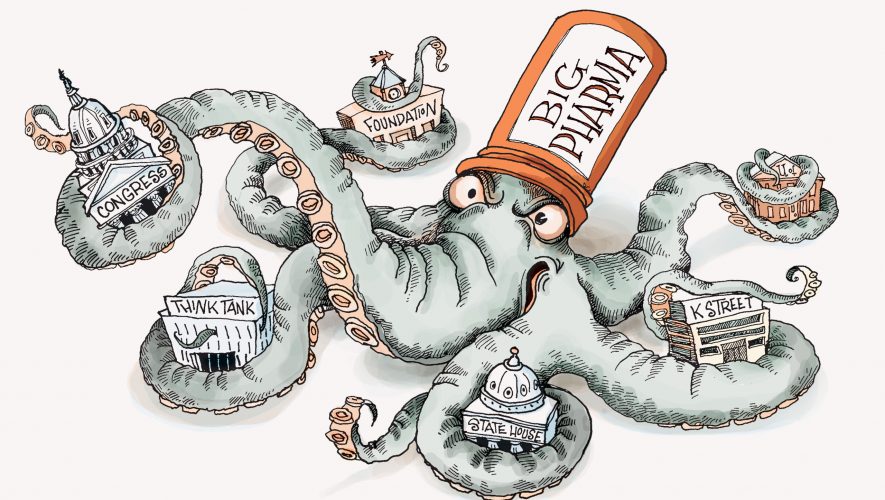On June 7, advocacy groups, Alzheimer’s patients, and their families celebrated as the US Food and Drug Administration (FDA) authorized the drug Aducanumab to treat Alzheimer’s. On the surface, this novel therapy—the first approved in 2003—seems massively encouraging for both the patients afflicted with Alzheimer’s and society as a whole.
Unfortunately, in authorizing Aducanumab, the FDA failed the American people.
Aducanumab is a type of protein called a monoclonal antibody; the drug targets and removes amyloid beta, another protein linked to Alzheimer’s. Biogen conducted two trials of Aducanumab; in the first trial, patients receiving the higher dose experienced a cognitive decline that was 23 percent less severe than control groups. However, in the second trial, dosage did not impact cognitive decline, with the placebo group performing better than both the high and low dose groups. In blatant disregard of foundational scientific practices, Biogen adjusted the dosage levels partway through the trial.
Post-trial analyses found that both trials reduced amyloid plaques in the high dose group, leading some scientists to theorize that the drug stymies Alzheimer’s development. But the hypothesis that amyloids contribute to cognitive decline in Alzheimer’s patients is unproven and still widely debated. Amyloid appears in people without Alzheimer’s, and the correlation between amyloid quantity and disease severity is incredibly weak. In addition, many other drugs that target amyloid have failed in clinical trials. It is a confusing and faulty presumption that Aducanumab is uniquely suited for success given its reliance on the same pathway as past letdowns.
Beyond unproven and debatable benefits, Aducanumab harmed trial participants. About 35 percent of those receiving the high dose experienced amyloid-related imaging abnormalities such as brain swelling and internal bleeding, which often present as headaches, confusion, and visual disturbance. While many cases were asymptomatic, 6.2 percent of trial participants in the high dose group discontinued treatment after symptoms started.
It’s discouraging enough that patient and pharmaceutical advocacy groups convinced America’s supreme food and drug regulatory agency to approve a drug based on faulty trials. But the FDA’s heedless justification, rooted in a negligible and unconvincing improvement in cognitive functioning and biomarker quantities, marks a terrifying new ignoble standard in the drug approval process. The triumph of desire over scientific evidence sends a strong message that government agencies are willing to overlook unfavorable facts under pressure from special interest groups.
Fortunately, special interests and cherry-picked trials did not fool the FDA’s independent advisory committee; ten of the eleven committee members voted against Aducanumab’s approval, with one voting “uncertain.” In a highly biased and unscientific manner, the FDA asked the committee to examine only the trial that indicated clinical improvement, not the complete data set. While not bound to the advisory panel’s decision, the FDA agrees with their decision about 80 percent of the time, with most discrepancies involving the agency issuing a more restrictive ruling than recommended due to safety concerns. Neurologists Joel Perlmutter and David Knopman, along with Harvard Medical School professor Aaron Kesselheim, resigned over the FDA’s blatant disregard for cost-effectiveness and risk minimization.
The monthly quit rate of restaurant workers hit a historic high of 5.6 percent in June; this doesn’t even begin to rival the FDA advisory panel’s over 27 percent quit rate for the same month. Many scientists are clearly unhappy with the FDA’s ill-advised approval.
Effective? Possibly. Cost Effective? Absolutely Not.
Cost effectiveness—questioning if treatment is worth the price even if it provides proven benefit to patients—is rarely discussed in the medical field. However, with Aducanumab, the questionable-at-best clinical benefit requires a thorough analysis of the treatment’s cost effectiveness. The drug costs $56,000 a year; while individual contributions vary by insurance policy, Kaiser estimated the annual co-payment at $11,500.
On average, you could save more than three children from malaria every year with just the co-payment. This figure doesn’t even account for other treatment costs such as transportation to infusion centers, lost productivity and wages due to time away from work to receive the drug, or treatment for possible brain swelling and other side effects.
Even if insurance theoretically pays the additional $44,500 per patient per year, the cost would burden our entire society. While the trials only included amyloid-positive early-stage Alzheimer’s patients, the FDA approved aducanumab for all Alzheimer’s patients regardless of stage or amyloid presence.
Most Alzheimer’s patients rely on the federally administered, taxpayer-funded Medicaid insurance program for treatment. At an estimated cost of up to $100 billion annually, Aducanumab would double Medicaid spending, placing a potentially insurmountable financial strain on an already struggling program. Medicaid currently accounts for 7 percent of the federal budget; it is unjustifiable that an additional $100 billion is necessary to cover a drug with questionable efficacy for a patient population much larger than the intent of the drug. Even if the drug did confer marginal benefits on a small group of patients, its price tag trickles down to all taxpayers. The burden of financing a drug that fails to reach its clinical endpoint is too high to justify approval.
The FDA reached a new and disappointing low, displaying a terrifying willingness to cherry-pick favorable evidence, ignore advice from experts about clinical efficacy and cost effectiveness, and collaborate with private drug companies like Biogen to create a joint review document that advocates for approval. Aducanumab’s approval was a harrowing mistake that has decreased the public’s trust in the agency. It will take the FDA decades of scrupulously scrutinizing scientific evidence for drug approval decisions to undo its new image as easily influenced by lobbying efforts.



